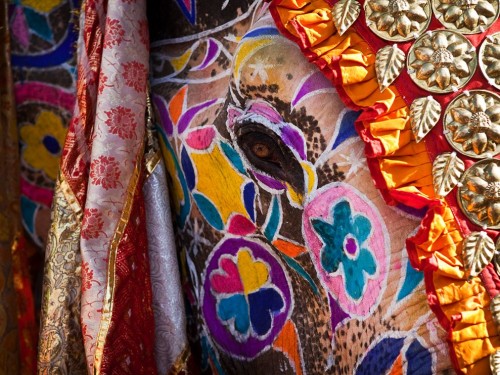
by Duriba Khan
“Exercise is important; being healthy is good. I mean, the post pregnancy Aishwarya Rai Bachchan is still just as flawless as the ‘Kajra Re’ Aishwarya Rai, but, why am I comparing myself to Aishwarya Rai? Duriba, you can’t be chubby. You fail at contouring and you have the fashion sense of a forty-year-old hippie man…”
Such was the stream of thoughts that swam across my mind last summer when my mom forced me into our ‘07 Honda Odyssey to give me a ride to the gym.
My parents, both from the medical field, find it vital to constantly reprimand me on how necessary it is to exercise daily, drink plenty of water and consume plenty of hearty almonds (you knew it was coming!). So it was no special occasion that I was now dragging my Nike sneakers across the local YMCA. I considered trying out the Zumba dance fitness class, but quickly changed my mind when I watched a group of brown aunties attempting to dance to Britney Spears’s “Toxic,” clearly sweating their kofta kababs off.
As I was on my way to the vending machine, I noticed an advertisement for a new movie theater style exercise room upstairs with treadmills instead of chairs. Better than nothing, I guess, just as I watched an aunty horribly attempting to “drop it low.” I darted up the stairs faster than my father on tax free weekend at Costco.
Upstairs, they were playing a Morgan Freeman movie about something to do with ice mountains and a bucket list (which at the time, was a new term for me).
A bucket list, I later learned from the deeply comforting voice of Morgan Freeman, is a compilation of everything one would ever want to accomplish in their life, no matter how lame, ridiculous or impossible.
Below is my, or sorry, our very own stereotypical brown girl bucket list.
-
-
- Attend a Holi celebration, and have a blast. Preferably with Ranbir Kapoor and Deepika Padukone, totally Balam Pichkari style.

- Actually have some Koffee with Karan.
- Become a doctor, and raise awareness for diseases taboo in our society.
- Become a lawyer, and fight for domestic violence survivors.
- Become an engineer, and construct a new irrigation system in a remote village back home.
- Learn how to do henna.
- Chug mango lassi.
- Attend a Holi celebration, and have a blast. Preferably with Ranbir Kapoor and Deepika Padukone, totally Balam Pichkari style.
-
-
-
- Successfully bargain at Forever 21.
- Meet the youngest recipient of the Nobel Peace Prize, Malala Yousufzai.
-
[Read related: 18 Most Memorable Feminist Moments of 2014]
-
-
- Ride an elephant on my wedding day. (I should probably let my parents know about this soon.)

- Learn to read and write pure, antiquated Urdu, so I can compose and read Urdu poetry.
- Be able to rock the socks and sandals look, like every brown guy, ever.
- Actually be on time to events.
- Have a gol gappa eating contest at a random street vendor in the motherland. Not getting gastrointestinal sick afterwards would be the real accomplishment.

- Learn to make round rotis.
- Drive a hot pink rikhshaw. Because, why not?
- Get into the Ivy League college of my parents’ dreams.
- Eat salaan roti without getting my French manicure stained. It’s the one thing turmeric is great for.
- Improve my Hindi to Katrina Kaif status, at least. This may also somewhat help me finally understand what the heck those relatives on the phone are saying.

- Record a classical Bollywood song with Lata Mangeshkar or Rahat Fateh Ali Khan.
- Ride an elephant on my wedding day. (I should probably let my parents know about this soon.)
-
-
-
- Have tamed, silky, long hair.
- Learn how to make biryani.
- Make a special appearance in “Aashiqui 2” as the chick who saves Aditya Roy Kapoor from committing suicide (SPOILER ALERT).
- Be the next desi YouTube sensation. Watch out IISuperwomanII, ZaidAliT and the Dhoombros! Actually, the Dhoombros can stay, and I’m totally okay with it if they want to collaborate with me. Pretty please with a rasgulla on top?

- Work modest fashion with attitude.
- Have naturally amazing eyebrows. Shout out to my eyebrow lady, Mehjabeen though. You the best, home girl.
- Have a song dedicated to you. Du-Du-Duriba sounds better than Ko-Ko-Korina, don’t you agree?
-
-
-
- Be featured on the “Desi Vines” page.
- Finally make my parents proud for doing something out of the ordinary!
- Hug Darsheel Safary aka the eight-year-old boy Ishaan from Aamir Khan’s 2007 “Taare Zameen Par.” That kid just hit everyone in the heart. Oh, and while I am it, raise awareness for kids with dyslexia.
- Be able to fluently translate a Punjabi song.
- Beat John Abraham in a match of arm wrestling, then proceed to accept his marriage proposal, because that’s how the natural progression of things go.
-
[divider]
 Duriba Khan, or “D-Dawg”, is a sixteen year old blogging, vlogging, photographing, filmmaking, sketching geek who enjoys long, romantic walks to the refrigerator. She is half Pakistani and half Indian, and currently resides in Austin, Texas. Duriba also feels uncomfortable writing about herself in the third person. For more of Duriba’s work, check out her blog.
Duriba Khan, or “D-Dawg”, is a sixteen year old blogging, vlogging, photographing, filmmaking, sketching geek who enjoys long, romantic walks to the refrigerator. She is half Pakistani and half Indian, and currently resides in Austin, Texas. Duriba also feels uncomfortable writing about herself in the third person. For more of Duriba’s work, check out her blog.




